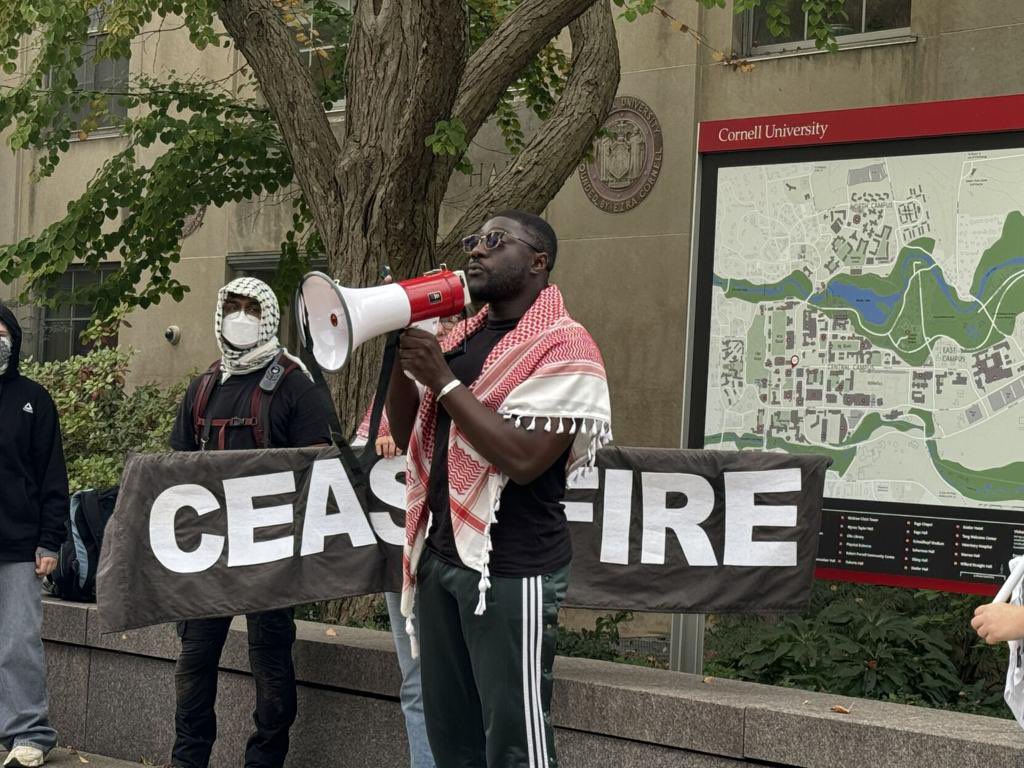Free speech has prevailed at Cornell University. Two weeks ago, UnHerd reported that Momodou Taal, a British citizen pursuing a PhD at the Ivy League university, had been suspended for a second time this year for his pro-Palestine campaigning. The ramifications for Taal were severe, with Cornell threatening his F-1 student visa status. Yesterday, news emerged that the university had backed down, deciding to take no further action against him.
Taal has a history of pro-Palestinian activism, including participating in the Gaza Solidarity encampments. After being suspended, he went on to protest against a careers fair that featured L3Harris and Boeing, arms manufacturers which supply weapons to the Israeli military. Taal claims he gave a five-minute speech at the outset of the rally which then turned violent. He says he left before the commotion, but that he was singled out by campus police because of his previous activism.
Cornell’s initial response was unforgiving, and Taal was denied an investigation. The university seemed determined to make an example of him: he would be suspended, his visa terminated and he would be given “no grace period” to leave the country. Cornell’s management accused students of engaging in “highly disruptive and intentionally menacing behaviour in a protest that shut down a career fair” and implied that this conduct was criminal, warning: “actions have consequences, on campus and in the criminal justice system.”
Protesting is disruptive — that is the point. But disruptive does not necessarily mean unlawful. In the police report which led to Taal’s suspension, Cornell accused him of “unauthorised use of university property by entering the hotel immediately behind individuals who had used force to gain entry” and that he “intentionally led or repeated chants that were unreasonably loud resulting in the significant disruption of university activities”. Trespassing is serious and loud chanting is a nuisance, but is it severe enough to merit the deportation of an international student?
Neither the police report leading to his suspension nor the university’s communications ever suggested that the British student had engaged in violent or threatening speech against anyone, which would be both illegal and reprehensible. His crime appears to be that he was vocally pro-Palestine.
Following widespread public outcry, the university realised that its case was shaky and dropped its case. Taal posted on social media: “Cornell University has decided to allow me to remain an enrolled student, which will allow me to keep my visa and submit my thesis.” He added: “This is a drastic shift from their position just two weeks ago, in which they were determined to see me removed from the US.”
His lawyer underlined why it was paramount that free speech prevailed: “Cornell’s administration attempted to set a dangerous precedent by collaborating with DHS [Department of Homeland Security] to rebuke a student’s visa without due process, and they failed.” Taal’s lawyer said that the case was “not only about Momodou’s rights”, but about everyone’s right “to hear the views Momodou espouses” and “engage in discussion”.
The past decade has shown how student activism can undermine free and open discourse on sensitive subjects at universities. But students should be free to protest legally and peacefully, without their institutions clamping down on lawful speech. Short of threatening or abusive behaviour, universities should back off. “Unreasonably loud” chanting is not grounds for deportation and the news of Taal’s victory should be welcomed by all defenders of free speech, regardless of political affiliation.










Join the discussion
Join like minded readers that support our journalism by becoming a paid subscriber
To join the discussion in the comments, become a paid subscriber.
Join like minded readers that support our journalism, read unlimited articles and enjoy other subscriber-only benefits.
Subscribe